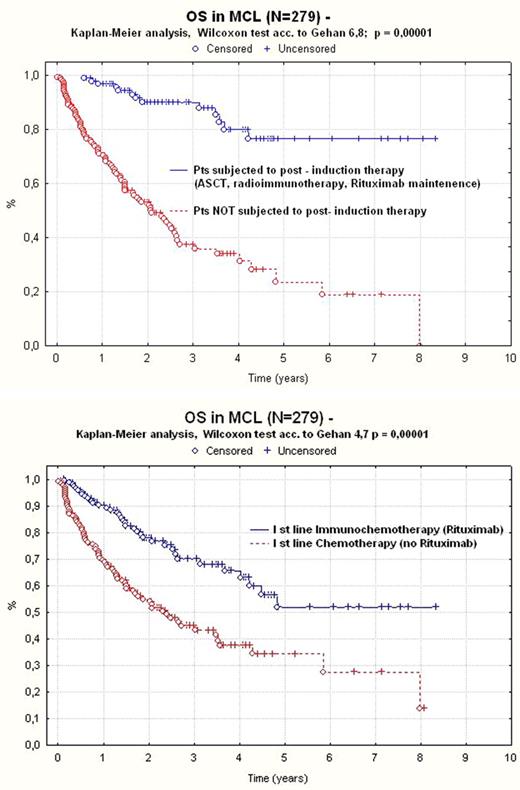Abstract
Abstract 1702
Poster Board I-728
ASCT consolidation in the first remission is the treatment of choice in MCL patients. However lack of adequate response to the first line therapy, elderly age and co-existing co-morbidities makes it feasible for less than a third of patients.
Retrospective analysis of 279 MCL cases treated at 10 PLRG centers was performed: 52% of them (144 pts) received Rituximab in induction therapy; 35% (97 pts) were subjected to post-induction therapy (ASTC – 16%, radioimmunotherapy consolidation – 13% and Rituximab maintenance – 6%). There were no significant differences in risk factor distribution among analyzed subgroups.
1) At 5 years OS was 40% in the whole group: 77% for those subjected to post-induction therapy vs 25% for those who were not; 5 year PFS is 20%, 48% and 5% respectively (p<0,0001, in both comparisons).
2) Pts with initial good response, whose treatment was NOT continued after induction, had inferior results (5 year OS and PFS – 30 and 10 % respectively) to those subjected to post-induction therapy (p<0,0001).
3) Rituximab included in the first line regimens increased RR, increasing % of pts that could be subjected to post-induction therapy: progression/ death during the first line therapy were 5,5% (8/144 Rituximab treated pts) as compared to 15,5% (21/135 treated without Rituximab).
With all limitations of retrospective analysis, it strongly supports the necessity of Rituximab immunochemotherapy followed by post induction treatment in MCL pts. The role of ASCT is established in younger patients, radioimmunotherapy consolidation or Rituximab maintenance should be considered in elderly and unfit ones.
No relevant conflicts of interest to declare.
Author notes
Asterisk with author names denotes non-ASH members.


